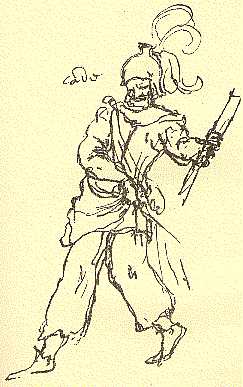Peasants' revolutions: Jack Cade
As in 1381, the rebellion of 1450 began in the southeast and spread to London, where similar grievances* were listed: heavy taxation, and abuses in local government*.
However, the rebels were this time more sophisticated, distressed by corruption in the royal Council, and supporting Parliamentary calls for reform. The revolt was better organized* (at least at first) than Wat Tyler's mobs, and was led by a soldier-- Jack Cade, self-proclaimed "Captain of Kent."
More on Shakespeare's treatment of "the rabble"*.
Promises, promises
Henry VI attempted to disperse the rebels forcibly, but his small army was routed by Cade, whose forces entered London July 2nd with the permission of the City Council; the mayor then presided over the executions of several government ministers.
But after two days of orderly occupation the rebels became unruly and destructive, and Londoners forced them out of the city. Queen Margaret and the Chancellor then persuaded the rebels to return home with promises and pardons, which, as in 1381, proved valueless.
Less trusting of the government, Cade himself was killed resisting arrest while attempting to raise a new army. Shakespeare's Cade (Henry VI, Part Two) is comic, but dangerous; a minor prototype of Falstaff.
Footnotes
-
Jack Cade's England
Cade's plans for reforming the economy, according to Shakespeare:
"Cade: Be brave, then; for your captain is brave, and vows reformation. There shall be in England seven halfpenny loaves sold for a penny; the three-hooped pot shall have ten hoops; and I will make it felony to drink small beer. All the realm shall be in common, and in Cheapside shall my palfrey go to grass; and when I am king, as king I will be--
All: God save your majesty!
Cade: I thank you, good people--there shall be no money; all shall eat and drink on my score; and I will apparel them all in one livery, that they may agree like brothers, and worship me their lord."
(Henry VI, Part Two, 4.2.65-76) -
Similar grievances
The more things change, the more they are the same: the grievances listed by those involved in the Midlands Revolt of 1607 were much the same.
-
An organized mob
Cade: Up Fish Street! Down Saint Magnus' Corner! Kill and knock down! Throw them into the Thames! (Sound a parley.) What noise is this I hear? Dare any be so bold to sound retreat or parley, when I command them kill?
(Henry VI, Part Two, 4.8.1-5) -
Shakespeare and "the rabble"
The common people, en masse, do not fare well in Shakespeare's plays. They are fickle, a many-headed monster. Antony, in Julius Caesar, cynically sways their affections from admiring Brutus to rage against him. In a later Roman play, Coriolanus, the citizens are consistently portrayed as short-sighted, unreasonable, and difficult to please; in this play, Shakespeare was possibly responding to a recent peasant uprising, in 1607.
Even in their bit part in Hamlet, as noises offstage supporting Laertes, the anonymous Messenger who reports the rebellion calls the people "the rabble":
They cry, "Choose we! Laertes shall be king!"
Caps, hands, and tongues applaud it to the clouds,
"Laertes shall be king! Laertes king!"
(4.5.107-10)
